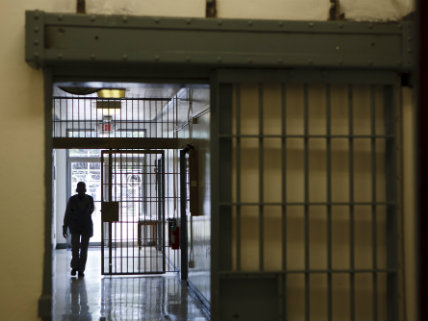Voters Get a Chance to Reverse Decades of Bad Criminal Justice Policy in Oklahoma
The Sooner State has the harshest drug laws in the country, so it's no surprise the state's prisons are over-crowded

Get caught twice in Oklahoma with a small amount of marijuana and you could be headed to prison for a decade.
Oklahoma's drug laws are some of the strictest in the entire nation. A second offense for possession of marijuana is treated as a felony, punishable by between two years and 10 years in prison. Even the two other states with similar rules for marijuana possession (Kansas and Wisconsin) have less severe penalties.
With policies like that, it's no coincidence that Oklahoma's prisons are bursting at the seams.
One out of every 76 Oklahomans was behind bars in 2015, according to the state Department of Corrections. The state's incarceration rate is the second highest in the nation, behind only Louisiana. No other state imprisons women at a higher rate. The state prison system is nearly 20 percent over capacity.
Voters in the Sooner State will get a chance to reverse some of those trends when they go to the polls in November. After asking for a rewrite, the state Supreme Court earlier this month approved a ballot measure asking voters if they want to reclassify some low-level drug offenses as misdemeanors instead of felonies. That would mean reduced prison sentences for non-violent offenders.
State officials advocating for approval of the ballot measure say it would ease the state's prison overcrowding problem and potentially save millions of dollars. A second ballot measure would redirect those savings in the state's criminal justice budget to drug rehabilitation programs run by local governments.
"The health and well-being of our communities is dependent on Oklahoma's willingness to re-evaluate how and when we incarcerate persons who commit crimes," says William Citty, chief of police in Oklahoma City.
Citty is a member of Oklahomans for Criminal Justice Reform, a coalition group including state lawmakers, business groups and even some high ranking members of Oklahoma's law enforcement community. The group pushed for the ballot measure and helped collect the 65,000 signatures needed to put it in front of Oklahoma voters.
The group says it's clear the state needs to move in a new direction after decades of "tough on crime" policies that have destroyed lives and caused prison populations to explode. High rates of felony convictions—one in 12 working age adult men have a felony on their record, according to the Tulsa Regional Chamber, a business group—have left many residents with fewer job prospects, adding to the state's welfare rolls and ultimately burdening taxpayers.
The ballot measures would build on a series of limited criminal justice reforms passed by the state legislature this year at the urging of Gov. Mary Fallin. Fallin made the state's budget-busting prisons a centerpiece of her budget this year.
In April, she signed a series bills giving prosecutors greater discretion in filing charges for low-level drug crimes, reducing mandatory minimums for drug offenders charged with possession and establishing a broader use of drug courts.
Still, lawmakers who fear being attacked for being soft on crime likely will be unable to pass the more sweeping reforms contained in Oklahoma's two upcoming ballet questions. Voters have the chance to act in their place.


Show Comments (4)